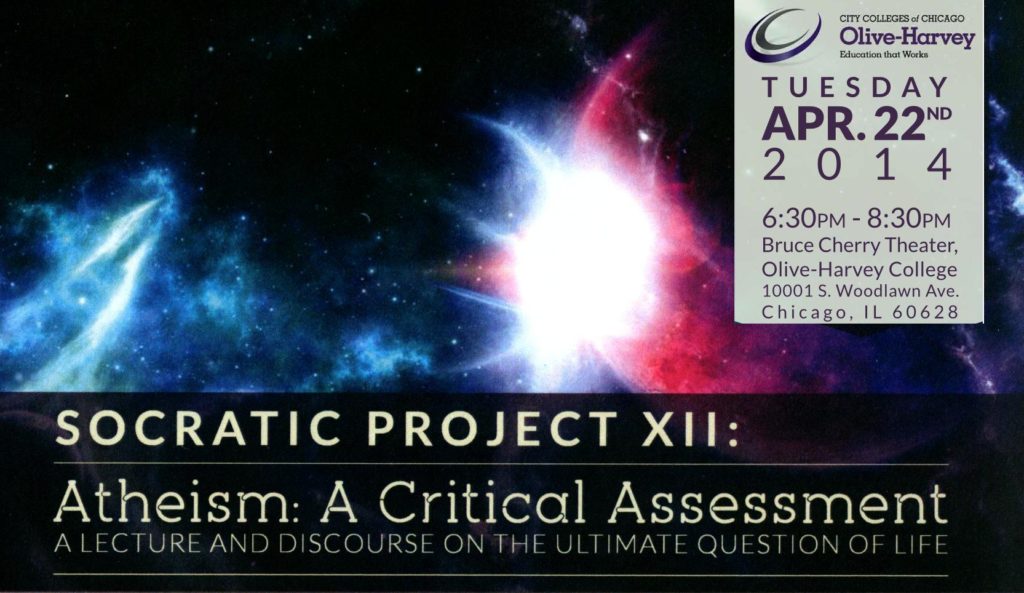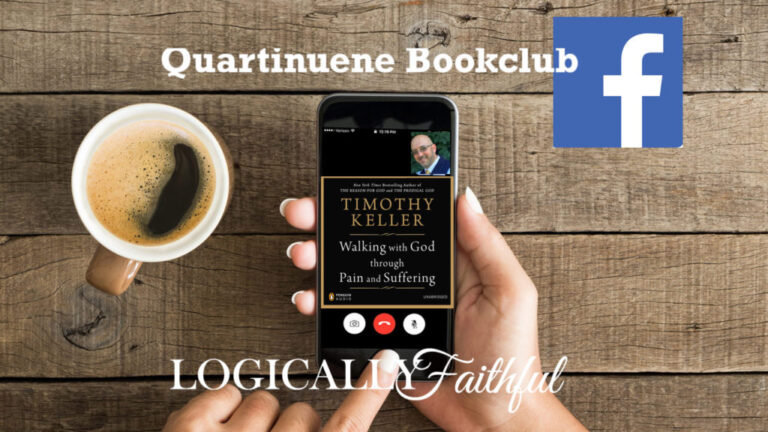The Socratic Project XII: Atheism: A Critical Assessment
Originally given at Olive-Harvey College on April 22, 2014. It is divided into 9 parts.
You can find the rest of the parts by searching for “socratic project xii” on youtube or go here
https://www.youtube.com/channel/UCBir735laoJbQkSnrB3HL4g
Your thoughts and criticism are more than welcome.





Reblogged this on Philosophically Faithful and commented:
https://new.livestream.com/accounts/7702946/events/2939323. Lecture link
Very interesting lecture, Dr. Sweis!
As a fellow proponent of the Socratic Method, as well as a self-described atheist, I hope you’ll entertain some of my replies to the positions you espouse in this video.
1. The Definition of Atheism
I recently discussed this topic on my own blog in a post entitled, “WLC insists that I am not an Atheist.” It has been my experience that most self-described atheists, these days, subscribe to the definition that atheism is simply the rejection of theistic claims– the “lack of belief” with which you explicitly disagree in the lecture. Regardless of whether or not this is the “correct” definition, that is the definition which describes our position. Therefore, if one’s goal is to converse with these self-described atheists, it makes no sense to adopt a definition which is not applicable to them. That would be like an atheist trying to discuss Christianity based on the idea that only those of the Eastern Orthodox Church are actual Christians.
2. Faith of the Fatherless
I am not familiar with Dr. Vitz work, but I’m going to go ahead and say that the focus on the family life of these men seems to constitute an Ad Hominem argument against atheism. The vast majority of atheists have no such issues with their fathers, myself included; and even in the case of those who do have such issues, the strength of their argument is unrelated to their family life. Interestingly, you noted that 90% of all people in prison have had problems with their fathers; but you neglected to note that only 1% of the prison population identifies as “Atheist.”
3. The Universe from Nothing
I agree that there is something of an equivocation fallacy being committed when someone asserts that something can come from nothing which results from the differences in the philosophical meaning of the word “nothing” as compared with the practical usage of the word. However, Lawrence Krauss, in his book, explicitly defines what he means when using the word “nothing.” I think it’s unfair to say he’s playing dishonest “word games” when he tells us precisely what he means. Personally, I think the whole question of “coming from nothing” is somewhat nonsensical, and a category fallacy.
Furthermore, the Aristotelian causation which Christian apologists often laud in cosmological discussion proves extremely problematic for traditional Christian theology, as well. The doctrine of “creatio ex nihilo” requires the rejection of Aristotle’s material cause just as much as any atheistic model requires the rejection of an effective cause.
4. Appeal to Emotion
Yes, if philosophical naturalism is true, then when people die, there is no afterlife for them. In such a case, there is no eternal punishment for those who commit evil acts; nor eternal reward for those who sacrifice in order to live good lives. I think most people– even most atheists– would agree that it is emotionally preferable to believe that we have eternal souls, and that bad people are subject to some sort of ultimate justice, and that good people receive some ultimate reward. However, the fact that these things are emotionally preferable says absolutely nothing about their veracity.
Thanks for your time! I look forward to your responses.
Thanks for this reply …what is your name?. I appreciate that you took time to watch and respond. I’ll get back to you soon.
Khaldoun
Thanks for your response, Dr. Sweis! I look forward to dialectic on this!
As for my name, I hope you’ll forgive my desire for anonymity, at the moment. Close members of my family, especially my parents, are unaware of the fact that I am no longer Christian. I keep this from them, not out of selfish fear, but because I know that they would be very hurt at the revelation, and very little positive would be gained from the pain.
For now, my blog title can serve as a pseudonym. Boxing Pythagoras– or some abbreviation thereof, like Pythagoras or simply BP– should serve us well, I hope.
Ok, Boxing Pythagoras it is or BP 🙂
My replies are below.
1. The Definition of Atheism
–Thanks for this feedback…however, as I stated, if one does not want to deny that God exists, then one would be an agnostic. Unless you add a new word to the english dictionary for your position. Atheism is not easy to define anymore for precisely the reasons you gave. I will honor what you want to call yourself as much as I can. But I refer you an article “The Definition of Atheism” in the Journal of Religion and Society (2009, VOL 11) that tires to break this definition down more. It should be available here http://moses.creighton.edu/jrs/2009/2009-4.pdf
2. Faith of the Fatherless
I am not familiar with Dr. Vitz work, but I’m going to go ahead and say that the focus on the family life of these men seems to constitute an Ad Hominem argument against atheism.
–True. And I agree it is NOT an argument against atheism any more than Freud’s Wish Fulfillment argument (http://www.philosophyofreligion.info/arguments-for-atheism/the-psychogenesis-of-religion/sigmund-freud-religion-as-wish-fulfilment/)
is an argument against God. Why we believe is irrelevant to whether what we believe is true or false. I only brought it out to show the emptiness of this argument when used against theists.
3. The Universe from Nothing
Even though Krauss, does explain what he means later, he does not explain it in his public appearances, and the very title of the book is misleading…”A universe from nothing” which even Dawkins sums it up in his afterword: “Even the last remaining trump card of the theologian, ‘Why is there something rather than nothing?,’ shrivels up before your eyes as you read these pages. If ‘On the Origin of Species’ was biology’s deadliest blow to supernaturalism, we may come to see ‘A Universe From Nothing’ as the equivalent from cosmology. The title means exactly what it says. And what it says is devastating.”
I stand by what I said, this is the fallacy of equivocation and is dishonest marketing.
Regarding the The doctrine of “creatio ex nihilo” –consider the book by Paul Copan on this issue http://www.amazon.com/Creation-out-Nothing-Philosophical-Exploration/dp/0801027330
4. Appeal to Emotion
(God, love and meaning) are emotionally preferable says absolutely nothing about their veracity.
–VERY TRUE… that is why I ended with saying that Dawkings is right and O’Reilly is wrong about truth. If something is true, is does not matter what you feel or want about it. If Atheism is true we have to accept it.
Thanks for your great feedback.
Khaldoun
Thanks again for your replies, Dr. Sweis!
1. Thanks for providing the link to Cliteur’s article. Having read it, I do not find it to be terribly convincing. Not only do I disagree with his assertions regarding Atheism, I don’t even think he treats Theism very fairly. Throughout the article, he constantly assumes a position that Theism is most properly asserted by a very Abrahamic conception of the term: a belief in one, single god who is the omnipotent creator of the cosmos. Of course, Cliteur would find himself vehemently opposed by polytheists, pantheists, panentheists, and others on such a definition.
When ancient Greek writers utilized the word from which we derive “atheism,” they used it as a general pejorative for perceived impiety. Christians and Jews were often called “atheists” for their assertion that there is only one god. Christians even called other Christians atheists when they denied the divinity of Christ, or the coeternality of Christ with the Father, or the cosubstance thereof, et cetera. As time went on, philosophers “redefined” atheism to better describe those to whom the term referred, as “the belief that God does not exist.” When Darwin and others came under philosophical attack in the 19th Century, Huxley coined the term “agnostic” in order to try to avoid the stigmatization associated with atheism. Modern self-described atheists hold that agnosticism and atheism are not mutually exclusive, but rather descriptive of two completely separate ideas; the former deals with whether or not one claims knowledge of a subject, while the latter deals with whether or not one claims belief of a subject. Why should the Enlightenment’s “redefinition” of atheism be preferred over the modern “redefinition?”
A theist philosopher is certainly welcome to attack the assertion that there exist no gods, and refers to such a position,as “atheism,” if he is careful to properly define his terms. However, if that philosopher is responding to someone who self-describes as atheist on the lack-of-belief definition, but does so by attacking the assertion that no gods exist, that philosopher is creating a scenario rife with Equivocation and Straw Men. Since almost no philosopher who self-describes as atheist accepts the no-gods-exist definition, what good does it do to cling to it? What good does it do to address and label a position which almost no one holds?
2. I’m glad to see that we are in absolute agreement, here. Thanks for expounding upon that!
3. Krauss has certainly explained his definition of “Nothing” in his public appearances. He quite often notes that philosophers have taken issue with his use of the word “nothing,” and he takes pains to describe precisely what he actually means. While I do agree that there is a fallacy of Equivocation implicit in much of the Universe-from-Nothing discussion, including the Dawkins quote you provided, I would still say that it does not seem fair to classify it as “dishonest.” It seems to be borne from a legitimate misunderstanding of the differences in the usage of the word. Neither Krauss nor Dawkins has very much training in philosophy, nor do they claim to be philosophers. It should come as no surprise that they did not fully understand “Nothingness” as it is there described. Now that Krauss has received criticism from philosophers, he does (as I mentioned) note that he is not referring to philosophical nothingness.
Thanks for recommending Dr. Copan’s book. I’ll add it to my extensive reading queue!
4. I’m glad we have another point of agreement, here. Truth is always preferable to untruth, in my opinion, regardless of whether it accords with my current beliefs.
Thank you, again, for your dialogue! Any conversations from which I earn even a bit of new learning is a treasure to me!
I really enjoyed the condensed presentation on atheism. Professor Sweis did a great job presenting the material. I was surprised by the correlation between a father/son relationship and atheism. I wonder if there is a higher prevalence between father/son vs father/daughter and atheism. I have an uncle who is an atheist when he revealed this to me was to ask him what happened in his childhood. And not I know that there is a basis for a person’s childhood experiences and religion. But I guess it can go both ways because this same uncle was raised my my grandmother, who was a devout Catholic. I was also stunned to learn that the majority of atheists are found in China and England. This information if something worth exploring more. I agree with Professor Sweis when he discussed the question of Who created God and his response in saying that “God is not caused because God is not an effect.” I think that the argument as to who made God can be also used against atheist because we can ask who created the universe. I don’t think it’s important to know who created God. It’ll be nice to know, but it is not necessary to know.The only important thing we need to know is that He exists. I also think that it is erroneous of modern cosmologist to believe that the universe was created from nothing. It is impossible that out of nothing so much was created. As John Lennox was quoted as saying, “nonsense remains nonsense”. I think the problem of evil is one of the major issues atheist have with God. I guess it makes sense to doubt the existence a God that supposedly allows so much suffering to occur. But it is not that God allows this to happen, it is because of our free will that we sometimes make wrong choices that have evil consequences.
Thanks for the feedback.
Pingback: download triplets of belleville
this is a test